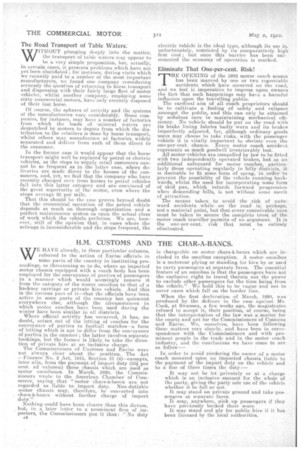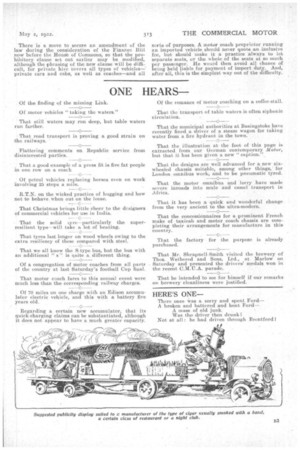H.M. CUSTOMS AND THE CHAR-A-BANCS.
Page 2

Page 3

If you've noticed an error in this article please click here to report it so we can fix it.
E HAVE already, in these particular columns, referred to the action of Excise officials in some parts of the country in instituting proceedings, or threatening so to do, where an imported motor chassis equipped with a coach body has been employed for the conveyance of parties of passengers in a manner which would seemingly remove it from the category of the motor omnibus to that of a hackney carriage or private hire vehicle. And this is the curious part of it--that the officials have been active in some parts of the country but quiescent everywhere else, although the circumstances in which motor coaches have been used during the winter have been similar in all districts.
Where official activity has occurred, it has, no doubt, arisen out of the letting of coaches for the conveyance of parties to football matches—a form of letting which is apt to differ from the conveyance of parties in the summer ; the latter involves separate bookings, but the former is likely to take the direction of private hire at an inclusive charge. The 'Commissioners of Customs and Excise were not always clear about the position. The Act —Finance No. 2 Act, 1915, Section 1-3 (4)—exempts, inter alia, from the payment of import duty (34 per cent, ad valorem) those Chassis which are used as motelomnibuses. In March, 1920, the Commissioners wrote to the American Chamber of Commerce, saying that "motor chars-a-ban.cs are not regarded as liable to import duty. Non-dutiable motor chassis may, therefore, be converted into chars-it-banes without further charge of import du ty, "
Nothing could have been clearer than this dictum, but, in a later letter to a prominent firm of importers, the Commissioners .putit thus : " No duty is chargeable on motor chars-h-bancs which are included in the omnibus exception. A motor omnibus is a, motorcar plying or standing for hire by or used to carry passengers at separate fares. The essential feature of an omnibus is that the passengers have not the exclusive right to travel therein nor the power to exclude other passengers for the time being from the vehicle." We hold this to be vague and not to cover eases which fall on the border line.
When the first declaration of March, 1920, was produced by the defence in the case against Mr. Cook, at Swansea, a few weeks ago, the magistrates refused to accept it, their position, of course, being that the interpretation of the law was a matter for the courts and not for the Commissioners of Customs and Excise. We, ourselves, have been following these matters very closely,and have been in correspondence With the Commissioners and with prominent people in the trade and in the motor coach • industry, and the conclusions we have come to are . as follow:— In order to avoid rendering the owner of a motor coach 'mounted upon an imported chassis liable to the payment of the import duty on the vehicle and to a fine of three times the duty:—
It may not he let privately or at a charge which is an inclusive amount for the whole of the party, giving the party sole use of the vehicle whether it he full or not.
It may stand on private ground and take passengers at separate fares. It may, anywhere, pick up passengers if they have previously booked their seats.
It may stand and ply for public hire if it has been licensed by the local authorities.
There is a move to secure an amendment of th law during the consideration of the Finance Bil. now before the House of Commons, so that the prohibitory clause set out earlier may be modified although the phrasing of the new clause will be diffi cult, for private hire covers all types of vehicles— private cars and cabs, as well as coaches—and al serfs of purposes. A motor coach proprietor running an imported vehicle should never quote an inclusive fee, butshould make it a practice always to let 'separate seats, or the whole of the seats at so much per passenger. He wouid then avoid all chance of being held liable for payment of import duty. And, after all, this is the simplest way out of the difficulty. 1
































